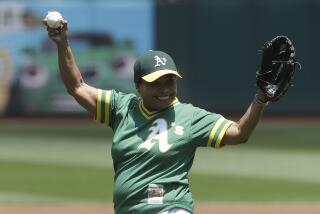Charlie Finley, Colorful Innovator in Baseball, Dies
Charlie O. Finley, the former Oakland Athletics owner whose often successful efforts to create winning teams and new ideas for baseball were overshadowed by his colorful and cantankerous personality, died Monday in a Chicago hospital.
A spokeswoman for Northwestern Memorial Hospital said Finley, 77, died of heart and vascular disease after being hospitalized for two weeks.
“He was great for baseball, years ahead of his time,” said Reggie Jackson, a Hall of Fame outfielder who played for the A’s from 1967 to 1975.
“At the time, people said he was eccentric. But when they look back, they see that he was innovative. He was always looking for things that made the game better.”
Finley’s A’s were baseball’s most dominant team during the early 1970s, winning five straight American League West Division championships from 1971 to 1975 and consecutive World Series championships in 1972, ’73 and ’74. No other team except the New York Yankees has won three straight World Series titles.
Serving as his own general manager, he employed some of the sport’s best and most charismatic players, such as Jackson, Jim “Catfish” Hunter, Vida Blue, Rollie Fingers, Sal Bando, Bert Campaneris and Joe Rudi.
“He put a great ballclub together,” Jackson said. “He was extremely knowledgeable about personnel.”
But he had even more impact with the changes that he inspired in the game, promoting the introduction of the designated hitter in the American League and night World Series games.
Cynics said he favored the latter because it would result in higher revenues for the sport from network telecasts, which it did, but he insisted that his motivation was to make more games available to working men and women and schoolchildren.
The major leagues also experimented briefly during exhibition games with his idea of using orange baseballs so that fans could follow them more easily, but officials were not satisfied with the texture of the leather. Rejected outright was his suggestion to shorten games by allowing walks to batters after three balls instead of four.
It was apparent that he would not be a traditional owner from the time he bought the A’s in 1960, while they were based in Kansas City. He adopted a mascot, a mule, and named it after himself, Charlie O, and had baseballs delivered to the umpire behind home plate by a mechanical rabbit.
During the fifth-inning break, he had water and cookies delivered to the umpire. The cookies were made by Oakland A’s employee Debbie Fields, who later used her recipes to form Mrs. Fields cookies.
After moving the team to Oakland in 1968, he began attempts to modernize the image of his players, putting them in multicolor uniforms and white shoes. He also offered them $300 bonuses to grow mustaches. Almost every player accepted the offer. Finley created nicknames for two pitchers, “Catfish” for Hunter and “Blue Moon” for John Odom.
“Charlie Finley was one of the masters of unique promotions of baseball,” said Stephen Schott, co-owner and president of the A’s. “In his heart, he knew that baseball was a game that is fun, first and foremost.”
In 1975, Time magazine placed Finley on its cover and called him “Baseball’s Master Showman.”
But Finley remained tied to the past in one area, financial compensation for players, and that led to his downfall as an owner. His teams were known as the “Feudin’ A’s” because of their clubhouse fights. Jackson said the one thing that brought the players together on the field was their contempt for Finley, primarily rooted in contentious contract negotiations with him.
Aware that he could not compete financially in the era of free agents with richer owners, Finley tried to sell three players--Fingers, Blue and Rudi--to other teams in 1976. He wanted to use the money he received for them to rebuild his team with younger, less expensive players, but the transactions were nullified. Commissioner Bowie Kuhn ruled that the move would render the A’s non-competitive.
Finley was unsuccessful in a court battle to overturn the decision by the commissioner, with whom he had a running feud. Finley once referred to Kuhn as “the village idiot.”
Finley subsequently lost most of his all-star players to free agency, and after attendance began to sag in the Oakland Coliseum, he sold the team in 1981 to the Levi-Strauss company for $12.7 million. A self-made insurance millionaire, he had bought the team for $1.9 million. He also at one time owned the California Golden Seals of the National Hockey League and the Memphis Tams of the American Basketball Assn.
“I don’t miss baseball,” Finley told the Washington Post from his 185-acre farm in LaPorte, Ind., in 1984. “Baseball misses me.”
On his farm’s outhouse door is a sign that says, “Often imitated, never duplicated.”
* RELATED STORY: C1
More to Read
Go beyond the scoreboard
Get the latest on L.A.'s teams in the daily Sports Report newsletter.
You may occasionally receive promotional content from the Los Angeles Times.










